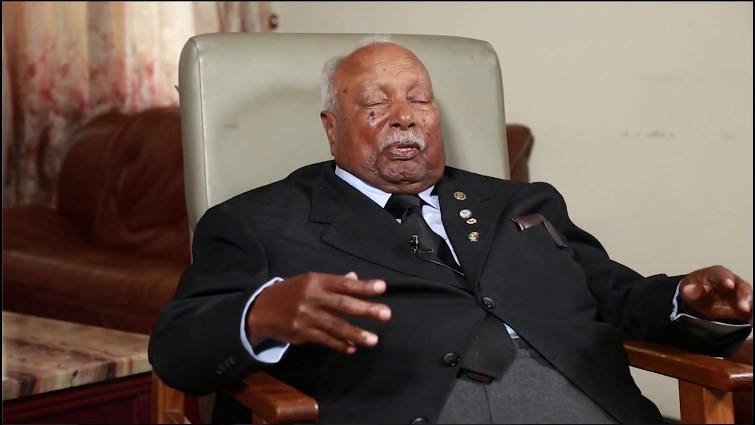Girma’s Life and Career

Girma Wolde-Giorgis, a prominent figure in Ethiopian history, served as the fourth President of Ethiopia from 2001 to 2018. His life and career were marked by a deep commitment to public service, diplomacy, and the pursuit of peace and stability in Ethiopia and beyond.
Early Life and Education
Girma was born in 1924 in the town of Gimbi in the Oromia region of Ethiopia. His family was deeply rooted in the local community, and he received his early education in traditional Islamic schools. Girma’s thirst for knowledge led him to pursue further education, eventually earning a law degree from the prestigious Haile Selassie I University in Addis Ababa.
Early Career and Political Life
Following his graduation, Girma embarked on a distinguished career in the Ethiopian civil service. He held various positions within the Ministry of Justice, demonstrating his expertise in law and governance. His dedication and integrity earned him the respect of his colleagues and superiors, propelling him further into the political arena.
Role as President of Ethiopia
Girma’s ascension to the presidency in 2001 marked a significant moment in Ethiopian history. He was elected by the Ethiopian Parliament, succeeding Negasso Gidada. Girma’s presidency coincided with a period of economic growth and political stability in Ethiopia.
Key Accomplishments
- During his tenure, Girma played a crucial role in promoting national unity and reconciliation, fostering dialogue between different ethnic groups and political factions.
- He was instrumental in strengthening Ethiopia’s international relations, fostering partnerships with countries around the world.
- Girma also focused on promoting human rights and the rule of law, contributing to the development of a more just and equitable society in Ethiopia.
Challenges Faced
- Despite the progress made during his presidency, Girma faced challenges related to poverty, inequality, and political unrest in certain regions of Ethiopia.
- He also had to navigate the complex political landscape of the Horn of Africa, a region characterized by conflict and instability.
Leadership Style and Impact
Girma was known for his calm demeanor, his commitment to dialogue, and his unwavering belief in the power of diplomacy. His leadership style was characterized by consensus-building and a focus on national unity. He consistently advocated for peaceful resolution of conflicts, both within Ethiopia and in the wider region. Girma’s impact on Ethiopian society was significant. He was seen as a symbol of unity and stability, and his leadership helped to lay the foundation for the country’s economic and social progress.
Contributions to Ethiopian Politics and International Relations
Girma’s contributions to Ethiopian politics and international relations were profound. He played a key role in shaping Ethiopia’s foreign policy, promoting peace and stability in the Horn of Africa, and strengthening the country’s ties with the international community.
Ethiopia’s Political Landscape During Girma’s Presidency: Ethiopia Girma

Girma Wolde-Giorgis served as the President of Ethiopia from 2001 to 2018, a period marked by significant political transformations. His presidency witnessed the transition from a one-party state to a multi-party system, bringing about new challenges and opportunities for Ethiopia.
The Transition to a Multi-Party System
Ethiopia’s political landscape underwent a major shift during Girma’s presidency. The country transitioned from a one-party state under the rule of the Ethiopian People’s Revolutionary Democratic Front (EPRDF) to a multi-party system. This transition was a result of a series of reforms implemented by the EPRDF, aiming to create a more inclusive and democratic political system. The transition involved the introduction of a new constitution in 1995, which guaranteed fundamental rights and freedoms, including the right to form political parties and participate in elections.
Challenges Faced by Ethiopia
Ethiopia faced several challenges during Girma’s presidency, including:
- Ethnic Tensions: Ethiopia is a multi-ethnic country with a diverse population. Ethnic tensions have been a persistent challenge, often leading to violence and conflict. The country’s federal system, designed to address ethnic diversity, has sometimes been accused of exacerbating ethnic tensions. During Girma’s presidency, several regions experienced ethnic-based conflicts, including the Oromia and Somali regions.
- Economic Inequality: Despite significant economic growth, Ethiopia continued to grapple with high levels of poverty and economic inequality. This disparity in wealth and resources contributed to social unrest and dissatisfaction among the population.
- Regional Conflicts: Ethiopia has been involved in various regional conflicts, including the border dispute with Eritrea. These conflicts have strained the country’s resources and hindered its development.
Girma’s Role in Navigating Challenges
Girma played a crucial role in navigating these challenges. As President, he emphasized the importance of national unity and reconciliation. He actively promoted dialogue and mediation to address ethnic tensions and regional conflicts. Girma also focused on strengthening the rule of law and promoting good governance. He encouraged the government to address economic inequality and promote inclusive development.
Comparison with Predecessors and Successors, Ethiopia girma
Girma’s approach to governance differed from his predecessors and successors in some ways. He was seen as a more conciliatory figure compared to his predecessor, Meles Zenawi, who was known for his strong leadership and firm control. Girma’s presidency was marked by a more inclusive approach to politics, with greater emphasis on dialogue and consensus-building. However, he was criticized by some for being too passive and not taking a more assertive role in addressing the challenges facing the country. His successor, Mulatu Teshome, continued the multi-party system and focused on economic development, but faced similar challenges related to ethnic tensions and political instability.
Girma’s Legacy and Impact

Girma Wolde-Giorgis’s presidency, though relatively brief, left a lasting mark on Ethiopia’s political landscape. His leadership during a period of significant transition and reform was characterized by a commitment to democratic principles, constitutionalism, and national unity. To fully grasp his legacy, it is essential to examine his achievements, shortcomings, and the enduring effects of his policies on Ethiopia’s political, economic, and social development.
Girma’s Key Achievements
Girma’s presidency was marked by several notable achievements, particularly in promoting democracy and fostering national reconciliation. He played a crucial role in consolidating Ethiopia’s transition to a multi-party system, overseeing the peaceful transfer of power after the 2005 elections, a landmark event in Ethiopia’s political history.
- Girma’s commitment to democratic principles was evident in his consistent upholding of the constitution, ensuring a separation of powers and the independence of the judiciary. This fostered a more inclusive political environment, promoting greater participation in the political process.
- Girma actively worked towards national reconciliation, emphasizing dialogue and consensus-building among diverse ethnic groups. He facilitated reconciliation efforts between the Ethiopian government and various rebel groups, contributing to a more stable and unified nation.
- Girma’s presidency also witnessed significant economic growth, driven by increased foreign investment and government initiatives. This economic progress, however, was unevenly distributed, with certain regions and communities benefiting more than others.
Girma’s Limitations and Criticisms
Despite his efforts, Girma’s presidency was not without its limitations and criticisms. His critics argued that he was too passive and lacked the assertiveness necessary to address some of the pressing challenges facing Ethiopia.
- One criticism was that Girma’s approach to governance was too conciliatory, failing to effectively address human rights violations and the suppression of dissent. This led to accusations of his administration being complicit in the government’s crackdown on opposition figures and civil society activists.
- Another criticism was that Girma’s presidency did not do enough to address the deep-seated ethnic tensions and inequalities that plagued Ethiopia. Despite his efforts at national reconciliation, some argued that he did not go far enough in tackling the root causes of these tensions.
- Girma’s critics also pointed to his failure to effectively challenge the ruling party’s dominance, arguing that he did not adequately promote the principles of good governance and transparency. They maintained that his presidency lacked the necessary impetus for real political reform.
Long-Term Impact of Girma’s Policies
Girma’s presidency had a significant impact on Ethiopia’s political, economic, and social development, shaping the country’s trajectory for years to come. His commitment to democracy and constitutionalism laid the foundation for a more open and inclusive political system, though challenges remain in strengthening democratic institutions and promoting greater accountability.
- Girma’s legacy in fostering national reconciliation continues to be relevant today, as Ethiopia grapples with complex ethnic tensions and conflicts. His emphasis on dialogue and consensus-building provides a framework for addressing these challenges and promoting national unity.
- Girma’s presidency also had a lasting impact on Ethiopia’s economic development, with the country experiencing significant growth during his tenure. However, the uneven distribution of this growth and the persistence of poverty and inequality remain significant challenges for Ethiopia’s future.
- Girma’s legacy is also reflected in the evolving social landscape of Ethiopia. His presidency witnessed increased awareness of human rights and the importance of civil society participation. While challenges remain in addressing issues such as freedom of expression and the rule of law, Girma’s legacy serves as a reminder of the importance of these principles for Ethiopia’s future.
Girma’s Place in Ethiopian History
Girma Wolde-Giorgis occupies a significant place in Ethiopian history as a symbol of transition, reconciliation, and the pursuit of democracy. His presidency marked a turning point in Ethiopia’s political landscape, laying the groundwork for a more democratic and inclusive society. While his legacy is not without its criticisms, his contributions to Ethiopia’s progress cannot be overlooked.
| Key Contributions | Lasting Effects |
|---|---|
| Upholding the Constitution and Promoting Democratic Principles | Strengthened the foundation for a more democratic and accountable government |
| Facilitating National Reconciliation and Dialogue | Contributed to a more stable and unified nation, though ethnic tensions persist |
| Overseeing Economic Growth and Development | Led to significant economic progress, but uneven distribution of wealth remains a challenge |
| Promoting Human Rights and Civil Society Participation | Increased awareness of human rights and the importance of civil society, but challenges in ensuring these rights remain |
Ethiopia girma – Ethiopia’s Girma is a rising star in the world of long-distance running, showcasing incredible stamina and a determined spirit. His performances are reminiscent of another remarkable athlete, soufiane el bakkali , whose dominance in the 3000m steeplechase is equally inspiring.
Girma’s future is bright, and he could become a formidable force in the world of athletics, just like El Bakkali.
Ethiopian runner Girma Gemechu is known for his incredible speed and endurance, especially in the steeplechase. His races are always exciting to watch, but they also come with inherent risks, as illustrated in this article on steeplechase falls.
Despite the potential dangers, Girma’s determination and skill have made him a force to be reckoned with in the world of athletics.